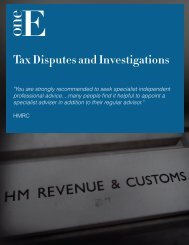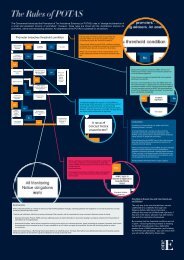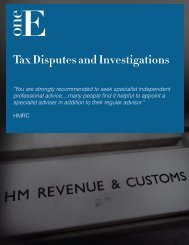Change to taxation of Landlords
Create successful ePaper yourself
Turn your PDF publications into a flip-book with our unique Google optimized e-Paper software.
Adapting <strong>to</strong><br />
the <strong>Change</strong>s<br />
Continued...<br />
We have illustrated the implications <strong>of</strong><br />
these changes <strong>to</strong> the <strong>taxation</strong> <strong>of</strong><br />
landlords.<br />
Let’s now take a look at some <strong>of</strong> the<br />
options that are available for landlords <strong>to</strong><br />
adapt:<br />
1. Deleveraging the Portfolio:<br />
First, the most obvious “solution”. Many<br />
commenta<strong>to</strong>rs have <strong>to</strong>uted the<br />
deleveraging <strong>of</strong> property portfolios (i.e.<br />
selling properties and using the<br />
proceeds <strong>to</strong> repay mortgages) <strong>to</strong> be the<br />
obvious solution for the worst hit<br />
landlords. However, the difficulties<br />
associated with this approach are <strong>of</strong>ten<br />
overlooked.<br />
Highly leveraged portfolios typically arise<br />
from regular refinancing, the cash from<br />
which is spent on growing the portfolio<br />
further.<br />
Where this has occurred over a number<br />
<strong>of</strong> years <strong>of</strong> ownership and capital growth,<br />
there may be insufficient equity – after<br />
lending has been repaid – <strong>to</strong> meet the<br />
costs associated with the disposal.<br />
We now consider an example <strong>of</strong> the<br />
implications <strong>of</strong> a sale <strong>of</strong> a highly<br />
leveraged property.












